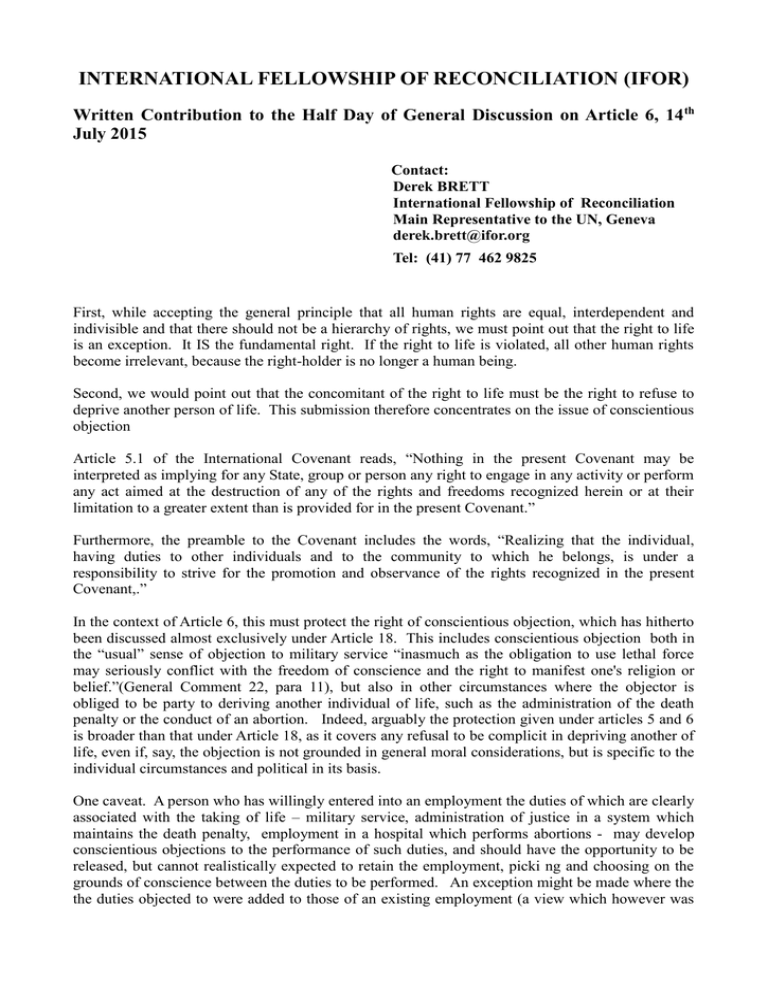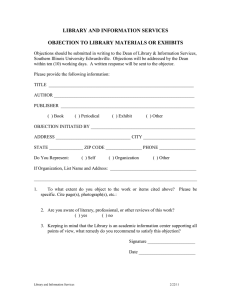INTERNATIONAL FELLOWSHIP OF RECONCILIATION (IFOR) July 2015
advertisement

INTERNATIONAL FELLOWSHIP OF RECONCILIATION (IFOR) Written Contribution to the Half Day of General Discussion on Article 6, 14 th July 2015 Contact: Derek BRETT International Fellowship of Reconciliation Main Representative to the UN, Geneva derek.brett@ifor.org Tel: (41) 77 462 9825 First, while accepting the general principle that all human rights are equal, interdependent and indivisible and that there should not be a hierarchy of rights, we must point out that the right to life is an exception. It IS the fundamental right. If the right to life is violated, all other human rights become irrelevant, because the right-holder is no longer a human being. Second, we would point out that the concomitant of the right to life must be the right to refuse to deprive another person of life. This submission therefore concentrates on the issue of conscientious objection Article 5.1 of the International Covenant reads, “Nothing in the present Covenant may be interpreted as implying for any State, group or person any right to engage in any activity or perform any act aimed at the destruction of any of the rights and freedoms recognized herein or at their limitation to a greater extent than is provided for in the present Covenant.” Furthermore, the preamble to the Covenant includes the words, “Realizing that the individual, having duties to other individuals and to the community to which he belongs, is under a responsibility to strive for the promotion and observance of the rights recognized in the present Covenant,.” In the context of Article 6, this must protect the right of conscientious objection, which has hitherto been discussed almost exclusively under Article 18. This includes conscientious objection both in the “usual” sense of objection to military service “inasmuch as the obligation to use lethal force may seriously conflict with the freedom of conscience and the right to manifest one's religion or belief.”(General Comment 22, para 11), but also in other circumstances where the objector is obliged to be party to deriving another individual of life, such as the administration of the death penalty or the conduct of an abortion. Indeed, arguably the protection given under articles 5 and 6 is broader than that under Article 18, as it covers any refusal to be complicit in depriving another of life, even if, say, the objection is not grounded in general moral considerations, but is specific to the individual circumstances and political in its basis. One caveat. A person who has willingly entered into an employment the duties of which are clearly associated with the taking of life – military service, administration of justice in a system which maintains the death penalty, employment in a hospital which performs abortions - may develop conscientious objections to the performance of such duties, and should have the opportunity to be released, but cannot realistically expected to retain the employment, picki ng and choosing on the grounds of conscience between the duties to be performed. An exception might be made where the the duties objected to were added to those of an existing employment (a view which however was not taken by the UK Supreme Court in the case of Doogan and Wood1 or the European Court of Human Rights in the parallel case of Ladele – which did not however involve the right to life.2 ) Another question is the directness of the involvement. In Shepherd 3, which hinged on the refusal of a helicopter maintenance mechanic to participate in actions which he judged might involve war crimes or crimes against humanity, the European Court of Justice ruled clearly that the protection “concerns the situation in which the military service performed would itself include, in a particular conflict, the commission of war crimes, including situations in which the applicant for refugee status would participate only indirectly in the commission of such crimes if it is reasonably likely that, by the performance of his tasks, he would provide indispensable support to the preparation or execution of those crimes”. However in the already quoted case of Doogan and Wood the UK Supreme Court held that administrative and supervisory duties in a hospital ward were too indirectly linked to the abortions carried out there to engage issues of conscience. What about employment in the manufacture of arms? There was a recent case in the UK where a claimant lost unemployment benefit after refusing such an offer of employment; and this question is the subject of a current campaign in Belgium. Then there is the question of tax. In J.P vCanada4, the Human Rights Committee found that Article 18 “certainly protects the right to hold, express and disseminate opinions and convictions, including conscientious objection to military activities and expenditures”, but then proceeded, without explaining its reasoning, to rule the case inadmissible, as citizens could “obviously” not be permitted to avoid taxation on grounds of conscience (actually misquoting the author's request, which was not to pay less tax, but to receive assurances about the expenditures to which her own tax payments would be applied). Finally, along with, but even more so than all other human rights, the right to life is severely threatened in time of war. It is essential that the General Comment carry a clear reaffirmation that human rights law continues to apply even in circumstances also covered by International Humanitarian Law. This means that any civilian deaths prima facie constitute a violation of the right to life. 1 2 3 4 Judgement UKSC_2013-0124, 17th December 2014 Application 51671/10, case of Eweida and Others v United Kingdom, Judgment of 15 th January, 2013. C472/13, judgment of 25th February 2015 Case No. 446/1991 – admissibility decision.

